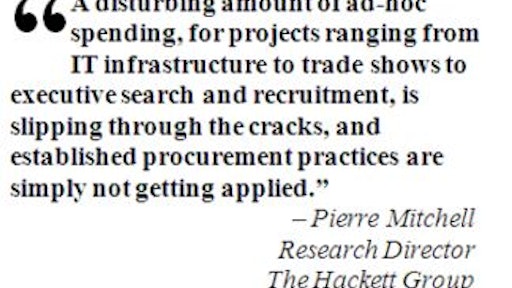
Atlanta — April 29, 2009 — Typical Global 1000 companies can drive up to $74 million in annual procurement cost reductions by improving their control of project-based indirect spending, according to a new study by The Hackett Group.
Hackett's study looked at how effectively procurement organizations manage and control non-recurring project-based indirect supplier expenditures in IT-telecom, human resources, sales and marketing, finance and corporate services, and capital equipment and services.
 The study, which polled both procurement organizations and also the budget owning functions, found that project-based spending represents up to 35 percent of all the total procurement spending and is often not well supported by the sourcing resources or processes of purchasing departments. In fact, the process is managed by dedicated sourcing professionals with specialized expertise only 17 percent of the time.
The study, which polled both procurement organizations and also the budget owning functions, found that project-based spending represents up to 35 percent of all the total procurement spending and is often not well supported by the sourcing resources or processes of purchasing departments. In fact, the process is managed by dedicated sourcing professionals with specialized expertise only 17 percent of the time.
Insufficient procurement staff resources, the need for specialized functional expertise and the requirement of fast turnaround are three of the most common reasons for limited procurement involvement in managing project-based spending, according to the study. But the support gap creates a "lose-lose" situation where procurement best practices are not applied.
As a result, both purchasing and budget owners are generally disappointed with the results, the study found. Budget owners are particularly dissatisfied with resulting pricing, contract flexibility and the ease and timeliness of the process.
The study quantified an achievable opportunity for a typical Global 1000 firm to drive $74 million in annual spend cost reductions (on an average annual indirect spend of $4 billion) by applying procurement best practices and increasing the percent of spending under their control to world-class performance levels.
According to Hackett Research Director Pierre Mitchell: "In today's economic climate, there's more pressure than ever before to get the most from every purchase. At the same time, businesses are trying to meet ever more aggressive operational goals. Yet a disturbing amount of ad-hoc spending, for projects ranging from IT infrastructure to trade shows to executive search and recruitment, is slipping through the cracks, and established procurement practices are simply not getting applied."
Mitchell noted that this category of spend represents a significant opportunity for procurement organizations, both in terms of demand management and also the possibility of employing a sourcing process and capability that better accommodates this type of one-off project-based spend. "Otherwise they set themselves up for failure and miss a tremendous opportunity to reduce spending, improve contract flexibility and generally better support their company from a strategic business perspective," the analyst said.
Solution providers have taken note of the opportunity to address this spend category as well. ICG Commerce, a procurement outsourcing company, recently announced its new Capital and Project Sourcing Desk (CAPS Desk), designed to help companies reduce the costs of purchases associated with critical non-recurring business projects.
Hackett's study looked at how effectively procurement organizations manage and control non-recurring project-based indirect supplier expenditures in IT-telecom, human resources, sales and marketing, finance and corporate services, and capital equipment and services.
 The study, which polled both procurement organizations and also the budget owning functions, found that project-based spending represents up to 35 percent of all the total procurement spending and is often not well supported by the sourcing resources or processes of purchasing departments. In fact, the process is managed by dedicated sourcing professionals with specialized expertise only 17 percent of the time.
The study, which polled both procurement organizations and also the budget owning functions, found that project-based spending represents up to 35 percent of all the total procurement spending and is often not well supported by the sourcing resources or processes of purchasing departments. In fact, the process is managed by dedicated sourcing professionals with specialized expertise only 17 percent of the time.Insufficient procurement staff resources, the need for specialized functional expertise and the requirement of fast turnaround are three of the most common reasons for limited procurement involvement in managing project-based spending, according to the study. But the support gap creates a "lose-lose" situation where procurement best practices are not applied.
As a result, both purchasing and budget owners are generally disappointed with the results, the study found. Budget owners are particularly dissatisfied with resulting pricing, contract flexibility and the ease and timeliness of the process.
The study quantified an achievable opportunity for a typical Global 1000 firm to drive $74 million in annual spend cost reductions (on an average annual indirect spend of $4 billion) by applying procurement best practices and increasing the percent of spending under their control to world-class performance levels.
According to Hackett Research Director Pierre Mitchell: "In today's economic climate, there's more pressure than ever before to get the most from every purchase. At the same time, businesses are trying to meet ever more aggressive operational goals. Yet a disturbing amount of ad-hoc spending, for projects ranging from IT infrastructure to trade shows to executive search and recruitment, is slipping through the cracks, and established procurement practices are simply not getting applied."
Mitchell noted that this category of spend represents a significant opportunity for procurement organizations, both in terms of demand management and also the possibility of employing a sourcing process and capability that better accommodates this type of one-off project-based spend. "Otherwise they set themselves up for failure and miss a tremendous opportunity to reduce spending, improve contract flexibility and generally better support their company from a strategic business perspective," the analyst said.
Solution providers have taken note of the opportunity to address this spend category as well. ICG Commerce, a procurement outsourcing company, recently announced its new Capital and Project Sourcing Desk (CAPS Desk), designed to help companies reduce the costs of purchases associated with critical non-recurring business projects.


























